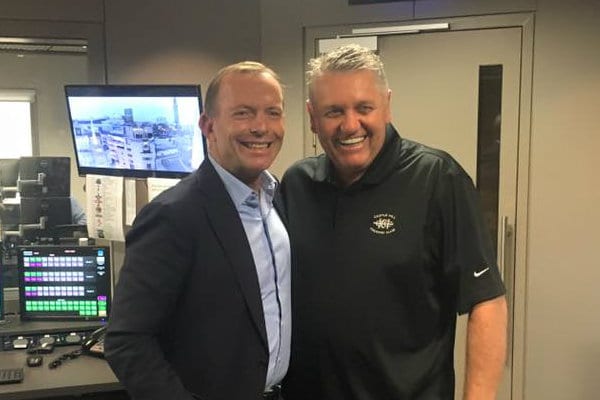The proposal which attracted Abbott’s ire, and that of radio host Ray Hadley, is hardly radical.
It was misrepresented by The Daily Telegraph as a great big scary quota but as this clarifying statement makes clear it isn’t.
What you'll find in the Monday edition of The @dailytelegraph https://t.co/P3s3KO2BWv pic.twitter.com/GJ5QEVltKy
— The Daily Telegraph (@dailytelegraph) April 30, 2017
The HRC has proposed a model which would encourage organisations to reach a 40:40:20 gender balance comprised of 40% men, 40% women and 20% unspecified, to allow for flexibility.
Given women do, and have done since time immemorial, comprise half the population and yet still hold a minor proportion of board seats, is this such an outrageous proposition?
According to Abbott, yes. He suggested the federal sex discrimination commissioner Kate Jenkins ought to “pull her head in”. (I mean, seriously, what exactly does Jenkins think she is doing mooting suggestions to minimise ‘sex discrimination’?)
“Obviously we have to give women a fair go, but some of this stuff sounds like it’s just anti-men,” the former PM told an equally unimpressed Hadley. “There are lots of things we can’t change but one thing we should never do is fail to call out politically correct rubbish.”
Indeed. So allow me to call out a little ‘political rubbish’, starting with Tony Abbott.
In the realm of gender equality the Federal Member for Waringah doesn’t have a leg to stand on. As Prime Minister he stood over a Cabinet with a single female, he gutted funding for women’s services and abolished the Women’s Budget Statement.
He complimented a female candidate on her “sex appeal” and counted the repeal of the carbon tax as his greatest achievement for the women of Australia. He failed to use his status as Minister for Women to advance the cause of women in Australia in any way whatsoever.
So let’s be clear: this is not a politician who is remotely interested in the progress of women.
Abbott – through actions and words – has displayed his unyielding personal belief that gender inequality neither exists nor matters. As such any proposal to redress the gender imbalance in society is a personal affront.
How else to explain his visceral reaction today to what can reasonably described as a reasonable suggestion?
To a more discerning mind, the question to be considered might be this. Why is it, that in a country like Australia that educates women as well as we do, in school and university, that is supposedly so invested in fairness, still requires a mechanism of sorts to achieve parity? Why has this not occurred by itself?
The answer lies in the men not willing to ask these questions.
To other men – men like Martin Fahy and Mark Burgess – the problem is abundantly clear.
Last Thursday at the Women, Super & Wealth Summit in Sydney these two men were uncompromising in their assessment of Australia’s gender gap.
"We need to change the way men behave" Mark Burgess – it effects the way women are paid & treated. #WomensSummit pic.twitter.com/FOQdB9emUB
— Georgie Dent (@georgiedent) April 27, 2017
The gap that means women are paid significantly less over their working lives. The gap that means women retire with 47% less super than men, which leaves women far more likely to face poverty and homelessness in retirement. The gap that means women and men are simply not offered the same opportunities as men.
“Young Australian women leave school believing they have an equal shot,” the CEO of the Association of Superannuation Funds of Australia Martin Fahy said. “At age 27 they realise they don’t. This is wrong, it is discrimination and the backlash – frankly, isn’t enough.”
And one-time Future Fund managing director and Yarra Capital Chair, Mark Burgess was unequivocal in laying blame for this.
“80% of the problem lies with men,” Mark Burgess said. “We need to change the way men behave [because] it effects the way women are paid and treated.”
In their outburst today neither Tony Abbott nor Ray Hadley could have proved Burgess’s point more powerfully if they tried.


